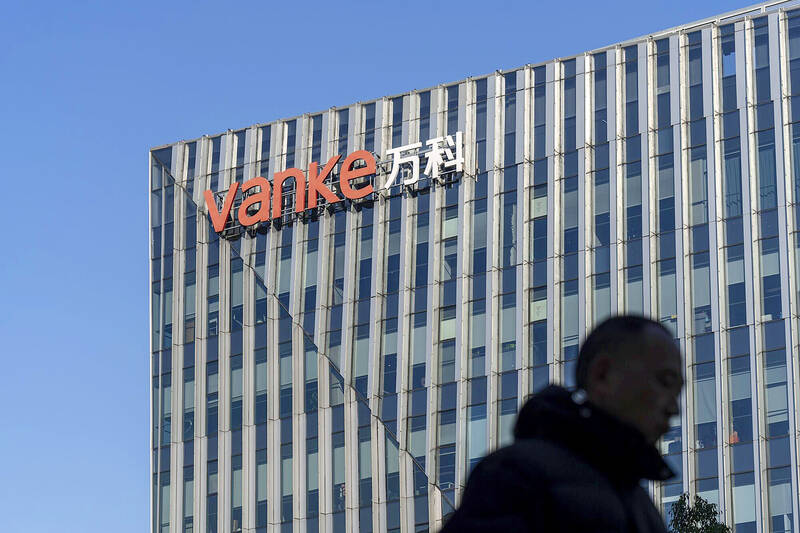China Vanke Co (萬科) rebounded from record lows in credit markets, as people familiar with the matter said the distressed developer had previously told some creditors it had enough cash prepared to repay a local note.
The firm told some creditors prior to turbulence in its bonds and shares yesterday that it had prepared enough cash to repay a 3 billion yuan (US$409.3 million) bond due on Jan. 27, the people said.
Uncertainty continued to swirl about the whereabouts of the company’s top executive following an earlier local news report that the property developer might be seized by state authorities.

Photo: Bloomberg
The builder’s bonds erased losses in the afternoon in Hong Kong, with its US dollar note due in May jumping US$0.066 to US$0.665 and its securities due 2027 rising about US$0.04 from record lows earlier in the day. Trading in three local bonds was halted after prices surged about 20 percent. The company’s shares were down 4.5 percent, paring losses after earlier tumbling as much as 9 percent in Hong Kong to the lowest since September last year.
Vanke CEO Zhu Jiusheng earlier answered a call from a Cailian reporter, several hours after the Economic Observer reported he had been taken away by police. The report was later deleted from the Chinese newspaper’s Web site. Further fueling uncertainty, Zhu promoted Vanke’s rental apartment business in a post on WeChat early yesterday.
Distress has deepened in recent weeks at the builder, a household name in China that had long been seen as more insulated from property crises, because of its state backing through its largest shareholder, Shenzhen Metro Group Co (深圳市地鐵集團). Vanke’s long-term corporate family rating was downgraded deeper into junk territory earlier in the day to B3 from B1 at Moody’s.
Vanke has been in the spotlight since the start of the year, as it faces a wall of debt repayments. The company’s home sales have been tanking, despite a flurry of support for the property market last year. The firm was once seen as too big to fail. However, Beijing has yet to signal its stance toward the property giant as the property crisis enters its fifth year after sparking record defaults.
The Economic Observer also reported that a task force sent by the local government of Shenzhen — where the developer is based — had stepped in to run the company and that Vanke might be taken over or restructured. The article also was later deleted from the newspaper’s Web site.
“China Vanke’s possible state takeover — including its CEO’s detention, as reported by the Economic Observer — signals new urgency in a drawn-out and costly property crisis that has shaken the country’s economy,” Bloomberg Intelligence analyst Kristy Hung said.
“Up next could be a management shake-up and a push to protect homeowners over bondholders, with a bailout and cash injection both less likely,” Hung said.
Vanke did not immediately offer comments when contacted by Bloomberg News.
The developer has US$4.9 billion in yuan and US dollar-denominated bonds maturing or facing redemption options this year, its highest annual amount ever, and the most for any Chinese developer this year, Bloomberg data showed. Trading in the company’s yuan bond maturing in November 2027 was halted after it plunged 32 percent, following similar actions on other securities in recent days.
Vanke has said it would make all efforts to deal with its public debt obligations this year.

In Italy’s storied gold-making hubs, jewelers are reworking their designs to trim gold content as they race to blunt the effect of record prices and appeal to shoppers watching their budgets. Gold prices hit a record high on Thursday, surging near US$5,600 an ounce, more than double a year ago as geopolitical concerns and jitters over trade pushed investors toward the safe-haven asset. The rally is putting undue pressure on small artisans as they face mounting demands from customers, including international brands, to produce cheaper items, from signature pieces to wedding rings, according to interviews with four independent jewelers in Italy’s main

Macronix International Co (旺宏), the world’s biggest NOR flash memory supplier, yesterday said it would spend NT$22 billion (US$699.1 million) on capacity expansion this year to increase its production of mid-to-low-density memory chips as the world’s major memorychip suppliers are phasing out the market. The company said its planned capital expenditures are about 11 times higher than the NT$1.8 billion it spent on new facilities and equipment last year. A majority of this year’s outlay would be allocated to step up capacity of multi-level cell (MLC) NAND flash memory chips, which are used in embedded multimedia cards (eMMC), a managed

Japanese Prime Minister Sanae Takaichi has talked up the benefits of a weaker yen in a campaign speech, adopting a tone at odds with her finance ministry, which has refused to rule out any options to counter excessive foreign exchange volatility. Takaichi later softened her stance, saying she did not have a preference for the yen’s direction. “People say the weak yen is bad right now, but for export industries, it’s a major opportunity,” Takaichi said on Saturday at a rally for Liberal Democratic Party candidate Daishiro Yamagiwa in Kanagawa Prefecture ahead of a snap election on Sunday. “Whether it’s selling food or

In the wake of strong global demand for AI applications, Taiwan’s export-oriented economy accelerated with the composite index of economic indicators flashing the first “red” light in December for one year, indicating the economy is in booming mode, the National Development Council (NDC) said yesterday. Moreover, the index of leading indicators, which gauges the potential state of the economy over the next six months, also moved higher in December amid growing optimism over the outlook, the NDC said. In December, the index of economic indicators rose one point from a month earlier to 38, at the lower end of the “red” light.